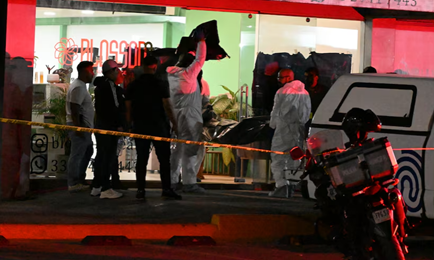Takes action against cartel member suspected in high-profile murder of Mexican TikTok influencer
WASHINGTON — Today, the U.S. Department of the Treasury’s Office of Foreign Assets Control (OFAC) sanctioned five Mexico-based leaders of Cartel de Jalisco Nueva Generacion (CJNG). CJNG is a brutally violent cartel responsible for a significant share of fentanyl and other illicit drugs entering the United States. It uses murder as a tactic to intimidate rivals, including sending messages to other cartels through the targeted killings of women. The recent discovery of a CJNG recruitment camp, Izaguirre ranch—which was reportedly used to execute recruits that defy instructions—underscores the cartel’s brutal methods.
With today’s action, OFAC is designating CJNG’s notorious leader Ruben Oseguera Cervantes (a.k.a “El Mencho”), along with three other senior cartel members. OFAC is also sanctioning a CJNG commander, closely linked to El Mencho, who has been identified as the prime suspect in the recent murder of Mexican influencer Valeria Marquez during a live social media broadcast.
“CJNG’s reign of terror across Mexico and its trafficking of fentanyl into the United States has destroyed countless innocent lives,” said Secretary of the Treasury Scott Bessent. “The United States remains strongly committed to leveraging all available tools to degrade the capacity of CJNG and other cartels to flood our streets with dangerous drugs and perpetrate heinous acts of violence against civilians.”
Today’s action was taken pursuant to Executive Order (E.O.) 14059, which targets the proliferation of illicit drugs and their means of production, and pursuant to E.O. 13224, as amended, which targets terrorists and their supporters.
CJNG’S REIGN OF TERROR
CJNG operates clandestine laboratories in Mexico to produce fentanyl, methamphetamine, cocaine, and other illicit drugs trafficked into the United States. CJNG also controls the deep-water port of Manzanillo in the Mexican State of Colima and runs fentanyl precursor procurement and other drug trafficking operations through the port. CJNG’s ruthless ambition to expand its operations has led the organization to deploy kidnappings, torture, bombings, and executions of civilians, Mexican politicians, and military and law enforcement officers.
On April 8, 2015, OFAC designated CJNG pursuant to the Foreign Narcotics Kingpin Designation Act (Kingpin Act) for playing a significant role in international narcotics trafficking. On December 15, 2021, OFAC also designated CJNG pursuant to E.O. 14059. On February 20, 2025, the U.S. Department of State designated CJNG as a Foreign Terrorist Organization (FTO) and a Specially Designated Global Terrorist (SDGT).
In addition to drug trafficking activities, CJNG is involved in a plethora of criminal activities, including fuel theft, timeshare fraud, migrant smuggling, and corruption. In a May 1, 2025 Treasury action against CJNG, OFAC sanctioned a network generating hundreds of millions of dollars through fentanyl trafficking, fuel theft, and the smuggling of stolen Mexican crude oil into the United States. The May 1 action was issued concurrently with a Financial Crimes Enforcement Network (FinCEN) Alert that provided typologies and red flags indicative of crude oil smuggling schemes on the U.S. southwest border associated with CJNG and other Mexico-based transnational criminal organizations.
CJNG LEADERS
Ruben Oseguera Cervantes (Oseguera) is the founder and current leader of CJNG. Oseguera’s unique leadership style has allowed CJNG to function like a franchise business across several Mexican states, and to generate billions of dollars in profits from trafficking fentanyl, cocaine, methamphetamine, and heroin. Oseguera and other senior CJNG members have engaged in extortion and made payments to corrupt officials to broaden their criminal activities. Under Oseguera’s direction, CJNG operatives have assassinated rivals, Mexican law enforcement, judges, and other government officials. The U.S. Department of State, through its Narcotics Rewards Program, is offering a reward of up to $15 million for information leading to the arrest and/or conviction of Oseguera.
Ruben Oseguera Cervantes is being designated pursuant to E.O. 13224, as amended, for being owned, controlled, or directed by, or having acted or purported to act for or on behalf of, directly or indirectly, CJNG.
Julio Alberto Castillo Rodriguez (Castillo) is a senior CJNG member and the son-in-law of Oseguera. Castillo’s influence at the port of Manzanillo in Colima, Mexico has facilitated CJNG’s procurement of precursor chemicals used to manufacture fentanyl and other illicit drugs trafficked into the United States. Castillo is regarded as a potential successor to Oseguera.
Gonzalo Mendoza Gaytan (Mendoza) is a high-ranking CJNG member. Mendoza is known for prolific recruitment strategies employed by CJNG to increase its foot soldiers. In March 2025, a CJNG recruitment camp in Teuchitlán, Jalisco, Mexico, known as Izaguirre ranch, was discovered to contain hundreds of items of clothing, shoes, bags, and skeletal remains. The ranch was allegedly led by Mendoza, who directed lieutenants to train new CJNG recruits and kill those who defied instructions. Mendoza has also been involved in the murder of numerous Mexican law enforcement officers.
Audias Flores Silva (Flores) is a CJNG regional commander in charge of large portions of CJNG territory in Mexican states of Zacatecas, Guerrero, Nayarit, Jalisco, and Michoacan. Flores controls clandestine laboratories in the central region of Jalisco and in southern Zacatecas that are used to produce methamphetamine and other illicit drugs trafficked into the United States. Flores commands a significant number of CJNG operatives who have carried out violence against civilians, law enforcement officers, and rival cartels in Mexico. The U.S. Department of State, through its Narcotics Rewards Program, is offering a reward of up to $5 million for information leading to the arrest and/or conviction of Flores.
Julio Alberto Castillo Rodriguez, Gonzalo Mendoza Gaytan, and Audias Flores Silva are being designated pursuant to E.O. 14059 and pursuant to E.O. 13224, as amended, for being owned, controlled, or directed by, or having acted or purported to act for or on behalf of, directly or indirectly, CJNG.
FEMICIDE EPIDEMIC: MURDER IN ZAPOPAN
Ricardo Ruiz Velasco (Ruiz) is a senior CJNG lieutenant close to El Mencho and is affiliated with a CJNG special forces unit. He has also been responsible for CJNG’s public communications and propaganda. Ruiz has been implicated in high-profile murders in Mexico for more than a decade, to include a deadly attack on Mexican police officers and the killings of a Jalisco State official and Venezuelan model.
Most recently, Ruiz was identified as a prime suspect in the femicide of his alleged romantic partner, Mexican social media influencer Valeria Marquez, who was killed while on a video livestream. The vicious attack highlights the brutal prevalence of femicide, or the killing of women on account of their gender, in Mexico. Femicide often goes unpunished and affects a significant portion of Mexico’s women.
Ricardo Ruiz Velasco is being sanctioned pursuant to E.O. 14059 and pursuant to E.O. 13224, as amended, for being owned, controlled, or directed by, or having acted or purported to act for or on behalf of, directly or indirectly, CJNG.


SANCTIONS IMPLICATIONS
As a result of today’s action, all property and interests in property of the designated or blocked persons described above that are in the United States or in the possession or control of U.S. persons are blocked and must be reported to OFAC. In addition, any entities that are owned, directly or indirectly, individually or in the aggregate, 50 percent or more by one or more blocked persons are also blocked. Unless authorized by a general or specific license issued by OFAC, or exempt, OFAC’s regulations generally prohibit all transactions by U.S. persons or within (or transiting) the United States that involve any property or interests in property of blocked persons.
Violations of U.S. sanctions may result in the imposition of civil or criminal penalties on U.S. and foreign persons. OFAC may impose civil penalties for sanctions violations on a strict liability basis. OFAC’s Economic Sanctions Enforcement Guidelines provide more information regarding OFAC’s enforcement of U.S. economic sanctions. In addition, financial institutions and other persons may risk exposure to sanctions for engaging in certain transactions or activities involving designated or otherwise blocked persons. The prohibitions include the making of any contribution or provision of funds, goods, or services by, to, or for the benefit of any designated or blocked person, or the receipt of any contribution or provision of funds, goods, or services from any such person.
Furthermore, engaging in certain transactions involving the persons designated today may risk the imposition of secondary sanctions on participating foreign financial institutions. OFAC can prohibit or impose strict conditions on opening or maintaining, in the United States, a correspondent account or a payable-through account of a foreign financial institution that knowingly conducts or facilitates any significant transaction on behalf of a person who is designated pursuant to the relevant authority.
The power and integrity of OFAC sanctions derive not only from OFAC’s ability to designate and add persons to the Specially Designated Nationals and Blocked Persons List (SDN List), but also from its willingness to remove persons from the SDN List consistent with the law. The ultimate goal of sanctions is not to punish, but to bring about a positive change in behavior. For information concerning the process for seeking removal from an OFAC list, including the SDN List, or to submit a request, please refer to OFAC’s guidance on Filing a Petition for Removal from an OFAC List.
Click here for more information on the persons designated today.
###
